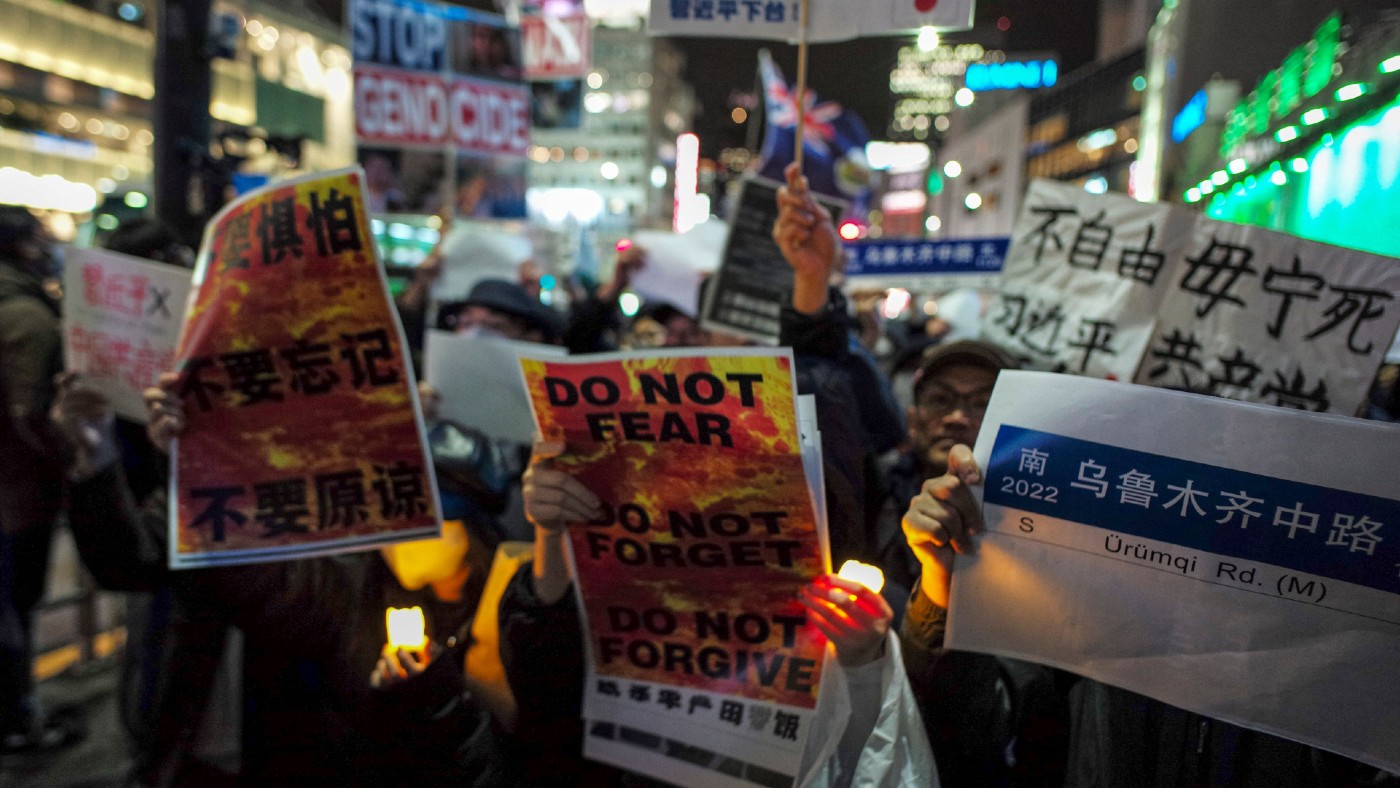The economic consequences of China’s protests
The push for greater freedoms could upend the established world order

A free daily email with the biggest news stories of the day – and the best features from TheWeek.com
You are now subscribed
Your newsletter sign-up was successful
“Share prices tumble on China anti-lockdown protests,” ran the early headlines. “Well, sort of,” said Nils Pratley in The Guardian. By the close of trading on Monday, even the main Chinese index was down only a smidgen more than 1%. And, despite being overpopulated with “China-sensitive” mining firms, the FTSE 100 fell by “a barely noticeable” 0.17%.
The lack of a serious reaction is odd, given that these protests were widely compared to those in 1989 – and particularly given that Beijing “has no good options” going forward. Sticking with its zero-Covid plan would require strict lockdowns in the areas which generate up to two-thirds of China’s GDP. And if those fail, there’s a risk of a national lockdown, “with an economic impact similar to that in early 2020”. Given what happened to supply chains then, the potential for a major global fallout is obvious.
The implications for multinationals with big manufacturing hubs in China, such as Apple and Tesla, are especially serious, said Bloomberg Businessweek. We’ve already seen workers riot at the iPhone-maker Foxconn. But companies with less heft may have even more trouble. The upshot, analysts advise, is that any Western company reliant on Chinese manufacturing should consider alternatives.
The Week
Escape your echo chamber. Get the facts behind the news, plus analysis from multiple perspectives.

Sign up for The Week's Free Newsletters
From our morning news briefing to a weekly Good News Newsletter, get the best of The Week delivered directly to your inbox.
From our morning news briefing to a weekly Good News Newsletter, get the best of The Week delivered directly to your inbox.
The protests could reshape the flow of global manufacturing investment, said Nathaniel Taplin in The Wall Street Journal. A key factor that encourages manufacturers to choose China – over, say, India – is that “investment-hungry local governments” have often acted decisively “to defuse political problems” that could complicate business. The scale of these protests, over labour conditions and Covid policies, will undermine confidence in this arrangement.
Challenging economic backdrop
The economic backdrop could hardly be more challenging for China, said David Rennie in The Economist. GDP growth, which clocked up a roaring 8% during China’s 2020 export boom, may struggle to reach 3% this year; youth unemployment is “worryingly high”; and political and regulatory barriers are hampering the cross-border investments and ties that “fuel innovation”.
Meanwhile, a property crisis has hit local government revenues just as bills for Covid spending come due. “The situation in the country is plainly tense and finely balanced,” said Robert Armstrong in the FT. “Another medico-political disruption could arise at any time.”
Perhaps the best we can hope for is that public anger will force an easing, said The New York Times. As the economist George Magnus puts it: “If there’s a glimmer of light, it’s that once the winter infection surge is over, China will move to ZCiNO: zero-Covid in name only.”
A free daily email with the biggest news stories of the day – and the best features from TheWeek.com
-
 The Olympic timekeepers keeping the Games on track
The Olympic timekeepers keeping the Games on trackUnder the Radar Swiss watchmaking giant Omega has been at the finish line of every Olympic Games for nearly 100 years
-
 Will increasing tensions with Iran boil over into war?
Will increasing tensions with Iran boil over into war?Today’s Big Question President Donald Trump has recently been threatening the country
-
 Corruption: The spy sheikh and the president
Corruption: The spy sheikh and the presidentFeature Trump is at the center of another scandal
-
 Corruption: The spy sheikh and the president
Corruption: The spy sheikh and the presidentFeature Trump is at the center of another scandal
-
 Putin’s shadow war
Putin’s shadow warFeature The Kremlin is waging a campaign of sabotage and subversion against Ukraine’s allies in the West
-
 The fall of the generals: China’s military purge
The fall of the generals: China’s military purgeIn the Spotlight Xi Jinping’s extraordinary removal of senior general proves that no-one is safe from anti-corruption drive that has investigated millions
-
 Epstein files topple law CEO, roil UK government
Epstein files topple law CEO, roil UK governmentSpeed Read Peter Mandelson, Britain’s former ambassador to the US, is caught up in the scandal
-
 Iran and US prepare to meet after skirmishes
Iran and US prepare to meet after skirmishesSpeed Read The incident comes amid heightened tensions in the Middle East
-
 Syria’s Kurds: abandoned by their US ally
Syria’s Kurds: abandoned by their US allyTalking Point Ahmed al-Sharaa’s lightning offensive against Syrian Kurdistan belies his promise to respect the country’s ethnic minorities
-
 Israel retrieves final hostage’s body from Gaza
Israel retrieves final hostage’s body from GazaSpeed Read The 24-year-old police officer was killed during the initial Hamas attack
-
 China’s Xi targets top general in growing purge
China’s Xi targets top general in growing purgeSpeed Read Zhang Youxia is being investigated over ‘grave violations’ of the law